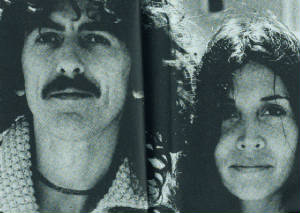|

The lyrics to "I Me Mine" were known to me long
before the October evening in 1974 when I met the man who wrote them. George and I had spoken by telephone many times because
I worked for his Dark Horse record label in Los Angeles. Still,
that first face to face meeting, followed by twenty seven years together, is just as vivid today as the last time I saw his
face.
During our life together the issues of possessions, attachment, and identification with the ego were in the forefront
of our awareness and George was always quick to point out that in reality there is no I, me, or mine.
George was relentless at keeping out spiritual aim true. We were only humans walking a long road towards our shared goal of
enlightment and I, for one, welcomed any reminders.
In the course of a day I might have said, "Oh, your bit
of the garden looks great," to which he would reply, "It's not my garden, Liv". It was his way of reminding himself and me
that we are pure Spirit and that the Spirit is in 'every grain of sand', belonging to everyone and no one; that nothing is
'mine' and that the 'I' we all refer to must be recognized as the little 'i' in the larger scheme of
the Universe. George was tired of the I Me Mines of this world, including his own, and had been from a very early age. When
searching for a title to this book, he was well aware that the lyrics to these songs would always be tied to his name and
considered his songs, even though he knew the creativity bestowed upon him was a divine gift. So rather than conjuring a book
that title that might try to explain away the gift of songwriting with, "Well, I wrote them but they don't really belong to
me" he took the opposite approach and the risk of claiming his book in a slightly cynical trinity of pronouns.
Reading
what Derek Taylor had to say about George was captivating once again. Perceptions of the man I dearly love by someone as insightful
and articulate as Derek have become somehow more important to me. Derek and George exchanged a special banter that often left
others in the room completely bewildered by their verbal shorthand. It took time if you wanted to join in because their points
of reference were wide reaching and covered decades of colourful and obsure characters and events, many shared during the
phenomenal days of the Beatles that gave them a private world of experiences from which to draw. George quoted the wisdom
of the great swamis, the Bhagavad Gita and the ancient Vedas, as well as the humor of Lord Buckley, The Goons, Lenny Bruce,
Mel's Brook's 'The Producers' and Monty Python. At the same time, Derek regaled us with history lessons on both wars,
commentary on current events and politics. If anyone in our household had a question pertaining to one of those subjects,
George always said, "Call Derek and ask him". He was very well read and shared with us information of all sorts, some of which
we did not really wish to know, but all of it presented amusingly. I wasn't always certain what was fact or folly (although
it didn't seem to matter).
The days they spent together working on this book were happy ones and took place over continuous
cups of tea for which Brian Roylance, who conceived and published the original, limited edition of "I Me Mine", was
mostly responsible, (being the binges of teas since Earl Grey himself). George and Derek's dialogue in these pages reveals
much about their relationship, which began in Liverpool- and as they used to remind us, "Being born in Liverpool carries with it certain responsibilities". They'd worked together for thirty years, so Derek's interviews
with George were second nature to both of them, yet they always managed to produce fresh recollections of their experiences.
All of us around during the writing of "I Me Mine" took laughter for granted. It must have been a real eye opener for
Brian, whose previous publishing endeavors we considered to be more serious documents, such as "The Log of the HMS Bounty"
and "Charles Darwin's Journal of a Voyage in HMS Beagle". I would wager Brian was surprised at the emergence of his
own sense of mischief and humour, which was appreaciated and encouraged. George and Derek led him astray in the best possible
way and he became one of George's closest friends and confidants, especially after Derek passed away in 1997. Brian and I
now share memories of those days along with the love and respect we all had for one another.
George and Derek found
hilarity concocting captians unrelated to the photos they were supposedly describing, some of which made it into the book.
The photo on plate XXII shows George holding his sitar, but the caption provoked letters to Genesis complaining that the reader's
copy must have the wrong photos because "George is not eating a cheese sandwich with anyone in the book".
And only
fans of Monty Python's Flying Circus would understand the captian to plate XVII- an obsure reference obviously meant to be
shared with those of like humour. Prinz Walter, a Python character, had wooden teeth. Compare the smile of Britian's ex-Prime
Minister, Harold Wilson, and you get the idea. First choice for the caption to play XLII, showing another ex-Prime Minister,
Edward Heath, at the piano with George standing behind, was:
George: "Do you know your balls are hanging
out?"
Ex-Prime Minister Heath: "No, but you hum it and I'll play it".
It was an old joke, but Derek and
George were shameless. If I put my mind to it, I can still see and hear them laughing around the kitchen table and I miss
them both dreadfully along with the joy their combined humour, intelligence, and affection brought into my life.
For
me the essence of this book is the lyrics and I believe they stand the test of time because they are written about man's eternal
quest, dilemmas, joys, and sorrows. George's lyrics were, in my opinion, the most spiritually conscious of our time, although
George, in turn, usually referred to the lyrics of Bob Dylan when trying to make a point or elucidate his own feelings of
isolation and frustration brought about by things in and beyond this life. Many times he said, "I wish I knew more words,"
but perhaps all the words in the world, including the Sanskrit and mantras integral to his vocabulary, could not fully express
his depth of feeling and realization. As I have found with other songwriters, George didn't give much away when explaining
lyrics. Wasn't it enough that he laid his emotions and thoughts on the line for everyone to hear? I finally stopped asking
George what his songs were about because his answers never seemed to satisfy my questions. "Liv, I just needed something to
rhyme with 'love', so I used 'glove'".
We relate music and words to our own personal life experience, but some of George's
songs are truly revealed only through a deeper realization of meaning and by allowing the melody, the lyrics, intonation,
and phrasing to seep in to tell the story, unfiltering by our own interpretations. Last summer we were discussing his songwriting
and he told me that whatever thought or theme inspired a lyric usually metamorphosed by the end of the song, sometimes before
the pencil even reached the papers, as in "Your Love is Forever". He began that song by writing about the days we were first
immersed in our love affair with Hawaii and each other but the love in the opening verse soon turned to Divine Love. George wrote, "My love
belongs to who can see it" and his songs belong to those who can really hear them. George's lyrics often captivated us
with one image and then led us to a loftier realm, transcending his initial inspiration.
Reading this book, I could
hear him singing each and every song and seeing the handwritten lyrics again, some on the stationery of places we were staying
at the time, vivified my recollection of those moments. I see my handwriting on the airmail envelope of "Learning How to Love
You". I wrote the first line of lyrics for him as he was working out the melody. Then he took the pen from my hand and wrote
words that would later guide him back to the thoughts he wanted to express. Leon Russel once told me I should write down all
amusing things George said, and often I did. Some of them ended up in songs and some were just plain endearing, such as, "I
like being master of nothing. It makes a change from all the smart arses". On other occasions it might be something someone
else had said that would catch George's attention, like drummer Jim Keltner who often told George he was a "soft touch", with
inspired the song.
Whatever the inspiration, it was always a privilege being witness to the birth of a song. You could
see the creative force of the muse at work. George would be playing a guitar, ukulele, or piano and suddenly become intently
focused as if she had tapped him on the shoulder to warn him it was coming. His head would tilt as if listening to something
only he could hear and his hand moved as if it was finding it's way to the next chords, like a diving rod finding waters.
I would be guit and try not to interfere with the process, although on occasion I have heard myself on tape blabbering in
the background about what to cook for dinner. Oh, I could kick myself when listening to those tapes. George was so patient
and concentrated. He just kept on playing, whether dinner was happening or not.
We were in the British Virgin Islands
in 1976 when George wrote "Soft Touch". His short paragraph about the writing of that song describes the mood and what was
going on around us, but for me there is so much more on that page, both in sentiment and notation- just tiny notes that speak
to me. At the bottom of the second page of the "Soft Touch" lyrics he printed "Bridge (noch ein mal)"- German for 'one more
time'. George used this phase occasionally from the time that they (The Beatles) used to shout it from the stage when they
played in Hamburg.
I remember Eric Idle joined us on that holiday. One afternoon we were playing a song on a small
cassette player, when I answered a knock on our door. Television producer Norman Lear introduced himself and told us that
the music was too loud and disturbing his wife who was trying to write. (The year was 1976, before the days of laptops, so
we'd been holidaying with the clacking of the typewriter next door and were hoping she was writing letters and not a book.)
This minor conflict briefly put a damper on thing, since it wasn't as much fun knoing the people next door were grumbling
about us. The next day Norman found out it was George Harrison playing the music and again knocked on our door, this time
apologizing and pleading for George to play as much music as he liked, not that he and Eric needed much encouragement, since
they always travelled with acoustic guitars.
Listening to his recordings has also taken me through the agony of his
absence even as the sound of his voice and slide guitar bring comfort. George singing was always beguiling to me and countless
times I was his audience of one. "Run of the Mill" was a song I often asked him to play, the lyrics so wise, especially the
reminder that "Tomorrow when you rise, another day for you to realize me" ("me" being God)- words that George not only wrote
but lived. The songs have also conjured up memories of those early days together- especially a song like "Your Love is Forever",
which was written in Hana, Maui, in February, 1978, when we were awaiting the birth of our son, Dhani.
George loved
the tropics and was always happiest there. He was inspired and wrote several songs during those days- "Dark Sweet Lady", Soft
Hearted Hana", and "Here Comes the Moon", the lyrics of which are dated 25/2 his birthday. The local general store stoced
guave jam, bamboo fishing poles and machetes, but was short of gifts for the man who was everything, so I bought George lots
of pens and paper to encourage the writing and, as I read the lyrics from that period, I'm glad I did. We swam in black lava
rock ponds with names like Venus Pool and a tiny cottage on a bay became our luxury home for those days- the greatest luxury
being the absense of a telephone and freedom from the usual demons on George's time. The locals bestowed upon us not only
privacy and Aloha spirit, but also tropical flowers we had never seen before; shell, torch, and kahili gingers mixed with
fragrant plumeria leis. We couldn't wait to return and plant our own tropical garden. Over the years, Derek and Brian
became guest gardeners, leaving a lush legacy of their visits with us. The many photos from that first holiday in Hawaii had
disappeared for over twenty years. While I was writing this introduction, they were returned to me. Among them was one of
the rising full moon, known in Hawaii as Mahina, that inspired George to write "Here Comes the Moon". The last time George
and I were there together was in February of 2001. The simultaneous sunset and moonrise in a gloaming sky, the waves crashing
over the rocks, the whales breeching in the sea, the reprise of rainbows and Haleakala Crater rising 10,000 feet in our backyard
once again humbled us and turned our faces toward God. We picked gardenias and played Hawaiian music over morning coffee while
sitting in the sun...the sun, so loved by George, partially because he felt deprived of this warmth as a child growing up
in England. But if it rained and the 150 foot waterfalls flowed, George was just as happy. "Sublime is the summertime arm
and lazy. These are perfect days like heaven about there," he wrote in "Your Love is Forever". Yes, they were perfect
for me too, George- about as perfect as it can be in this physical world.
Memories of those nights together are a gift...him
playing acoustic guitar or ukulele under a big moon where the nights were warm and we cheated the English winter of the chance
to chill our bones. In spite of the human tendency to take one's mate for granted, even then I was well aware that these were
precious moments. I was also blissfully ignorant of how short our days together were meant to be. Those memories will resound
with love and reverence for the rest of my life and I don't mind saying on this occasion that they are 'Mine'.
Olivia
Harrison
|




